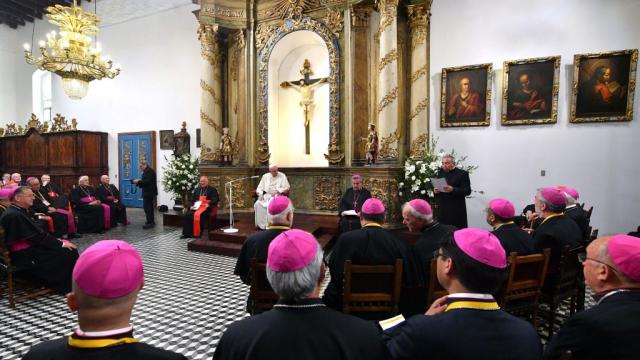Secret Shame — We Need to Close Accountability Gap in Abuse Among Religious Groups
By Huma Yasin
Sexual abuse within religious communities is not a new phenomenon, but appears to be more prevalent recently as headline-making cases spark attention. The Southern Baptist Theological Seminary recently fired former president Paige Patterson after reportedly telling a seminary student and victim of rape to forgive her attacker and not report the incident to the police. He is also accused of covering up the sexual abuse perpetrated by another Southern Baptist leader on a member of his youth group, though he allegedly knew of the abuse and failed to report it. In the Mormon faith, sexual abuse survivor McKenna Denson recently sued Bishop Joseph L. Bishop, who was president of Provo’s Missionary Training Center, and The Church of Jesus Christ of Latter-day Saints, for repeated abuse that allegedly occurred when decades ago she was a young “sister” missionary. Last month, 34 Chilean bishops offered their resignation for the cover-up of sexual abuse of children. In January, Pope Francis accused victims of sexual abuse of slandering Bishop Juan Barros who had allegedly witnessed the abuse. A few months later, Pope Francis penned a letter, asking forgiveness for his “grave errors” in judgement. While the #Metoo and #ChurchToo has gained steam, more needs to be done to acknowledge and address sexual assault, particularly in minority and religious communities who historically under report sexual assault. Policy makers need to address the urgency of these cases and to hold individuals accountable to laws criminalizing these behaviors. Minority and targeted communities have the added burden and guilt associated with reporting an individual to a system that has historically engaged in disparate treatment. Calling the police can literally be a death sentence for a person of color, as it was for Shukri Ali who was shot and killed by police officers after her family called 911 when she began exhibiting symptoms of her mental illness. Add into the mix, the suspicions and stereotypes surrounding religious communities, and the question becomes is the truth worth the risk? Communities of color are often put in an untenable position, trying to save their community from unwanted negative attention and stereotypes, while attempting to get some form of justice. As a woman in the Muslim community, I know that within my community, there have been instances of extreme abuses of power. But exposing the rare instances would only go to further racist, xenophobic, and Orientalist perceptions. This creates two systems of oppression, one outside of the community, and one inside. The pressure to project a model minority image is pervasive, especially in light of an American administration with a history of blatant and unfiltered Islamophobia. But it is also unrealistic. We share the same fallibilities as everyone else. Self-regulating institutions must specifically delineate standards of appropriate conduct and proscribe normative ethical behavior. Some faith-based organizations, such as the Rabbinical Assembly and the U.S. Conference of Catholic Bishops have created such a framework. This places all stakeholders on notice and eliminates the lack of knowledge excuse. As Muslims, we struggle with the same issues and power dynamics that have impacted all other faith-based communities. Abuse is neither faith nor race-specific; it is a human problem that is revealing itself to be ubiquitous. And like other communities, we’ve learned that the perpetrators of abuse are few, but the list of survivors left in their wake are large. And these perpetrators thrive in environments where an accountability gap exists. Often, the institution where they work is either complicit in their abuse or if the perpetrator is terminated the specific reasons for their termination aren’t publicly revealed, so they’re recycled into positions at different institutions with a fresh community to prey on. Religious communities have an added burden, particularly when the abuser holds himself or herself out to be a spiritual guide, shepherding his flock. In these cases, the religious community itself is often guilty of creating a hostile environment for victims to come forward. Jimmy Hinton, a Pennsylvania-based Christian minister, writes, “It’s a shame that sexual assault survivors have survived their abuse only to be forced to survive churches.” Survivors of abuse are reluctant to report the abuse to administrators or law enforcement, come forward publicly and address the community about the perpetrator. Unfortunately, that concern is not unfounded. Fostering safe spaces where survivors of abuse can report the abuse they’ve experienced will have a long-last impact on changing the power dynamics for abusers. Victims of abuse must be given a space to be heard, to be believed, and to be vindicated. The perpetrator must be publicly named to prevent his or her ability to reinvent an identity in a different institution. The specifics of the conduct need to be transparent to provide notice for both the community and potential perpetrators that this conduct will not be tolerated. While this work is difficult, contentious, and exposes the underbelly of both religious and minority communities, it is critical. Failing to provide a safe environment where survivors can report abuse and neglecting to enforce strict accountability measures are the equivalent of silencing victims and enabling abuse. The accountability gap that provides immunity and impunity to abusers needs to close for good. Huma Yasin is an attorne and co-founder of Facing Abuse in Community Environments, and the author of the forthcoming book, Conspiracy: The True Story of the Fort Dix Five. She is a Public Voices Fellow through The OpEd Project.
|
.
Any original material on these pages is copyright © BishopAccountability.org 2004. Reproduce freely with attribution.
